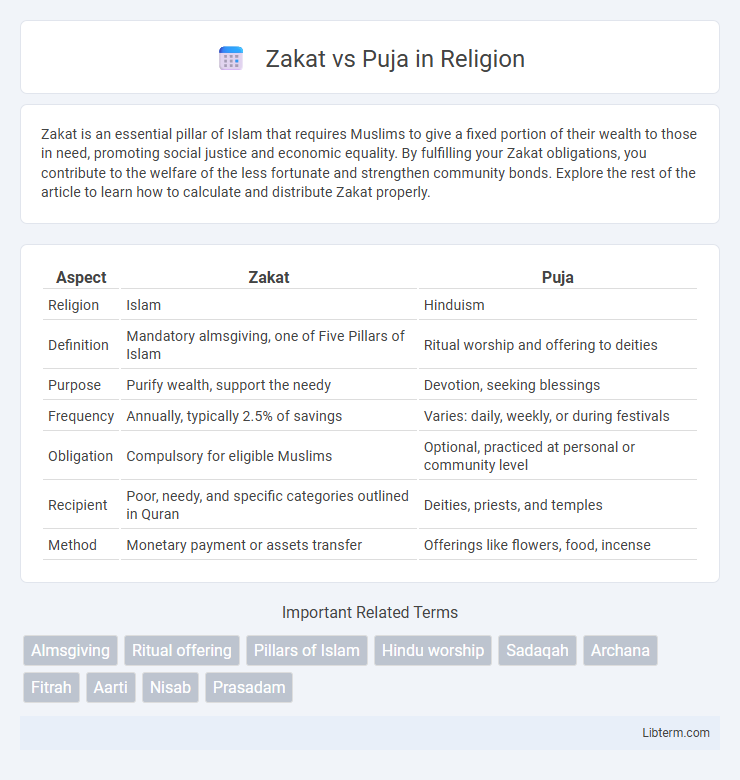Zakat is an essential pillar of Islam that requires Muslims to give a fixed portion of their wealth to those in need, promoting social justice and economic equality. By fulfilling your Zakat obligations, you contribute to the welfare of the less fortunate and strengthen community bonds. Explore the rest of the article to learn how to calculate and distribute Zakat properly.
Table of Comparison
| Aspect | Zakat | Puja |
|---|---|---|
| Religion | Islam | Hinduism |
| Definition | Mandatory almsgiving, one of Five Pillars of Islam | Ritual worship and offering to deities |
| Purpose | Purify wealth, support the needy | Devotion, seeking blessings |
| Frequency | Annually, typically 2.5% of savings | Varies: daily, weekly, or during festivals |
| Obligation | Compulsory for eligible Muslims | Optional, practiced at personal or community level |
| Recipient | Poor, needy, and specific categories outlined in Quran | Deities, priests, and temples |
| Method | Monetary payment or assets transfer | Offerings like flowers, food, incense |
Introduction to Zakat and Puja
Zakat is a fundamental pillar of Islam, representing a mandatory form of almsgiving aimed at wealth purification and social equity, typically calculated as 2.5% of an individual's savings annually. Puja is a Hindu ritual involving devotional worship to deities, encompassing offerings, prayers, and ceremonies to seek blessings and spiritual connection. Both practices serve distinct religious purposes, with Zakat emphasizing charity and community welfare, while Puja focuses on devotion and spiritual rituals.
Origins and Historical Background
Zakat, rooted in Islamic tradition, originates from the Qur'an and Hadith, establishing it as one of the Five Pillars of Islam designed to promote social equity through mandatory almsgiving. Puja, emerging from ancient Hindu practices, dates back to Vedic rituals where it served as a ceremonial worship involving offerings to deities to foster spiritual connection and divine blessings. Both practices reflect deep historical and cultural significance within their respective religions, emphasizing charity and devotion, yet they differ fundamentally in purpose and ritual context.
Core Purpose and Philosophy
Zakat is a fundamental pillar of Islam centered on charitable giving to purify wealth and support the needy, emphasizing social justice and economic equity. Puja, a key ritual in Hinduism, serves as an act of devotion and worship to deities, focusing on spiritual connection and divine blessings. Both practices reflect core religious values but differ in purpose: Zakat prioritizes communal welfare while Puja fosters personal spirituality.
Religious Significance in Islam and Hinduism
Zakat in Islam is a mandatory act of charity and one of the Five Pillars, symbolizing social justice, purification of wealth, and spiritual growth by redistributing a fixed portion of assets to the needy. Puja in Hinduism is a ritualistic worship that involves devotional offerings and prayers to deities, reflecting reverence, spiritual connection, and the seeking of blessings for prosperity and well-being. Both practices hold deep religious significance, emphasizing devotion, ethical values, and fostering a sense of community within their respective faith traditions.
Rituals and Practices Explained
Zakat, one of the Five Pillars of Islam, involves the ritualized annual giving of a fixed portion of wealth (usually 2.5%) to charity, emphasizing purification of wealth and social welfare. Puja, a Hindu ritual, encompasses diverse practices such as offering flowers, food, and prayers to deities, performed daily or on special occasions to invoke divine blessings and maintain spiritual connection. While Zakat centers on obligatory financial almsgiving governed by specific religious laws, Puja integrates symbolic worship and personalized devotion, highlighting contrasting approaches to religious rituals.
Who Participates in Zakat vs Puja
Zakat is a mandatory form of almsgiving practiced by Muslims worldwide, requiring financially eligible individuals to give a fixed portion of their wealth annually to support those in need. Puja, a Hindu ritual, is performed by devotees of varying ages and social statuses, typically involving prayers and offerings to deities at home or in temples. While Zakat participation is legally and religiously obligatory for Muslims meeting specific financial criteria, Puja participation is voluntary and culturally embedded across diverse Hindu communities.
Timing and Frequency of Observance
Zakat in Islam is an annual obligation typically paid once a lunar year (Hijri year) passes on a qualifying amount of wealth, emphasizing a fixed timing based on individual financial cycles. In contrast, Puja in Hinduism is performed regularly, ranging from daily rituals to special ceremonies on specific lunar calendar dates, reflecting flexible and varied timing depending on regional and familial traditions. The frequency of Zakat is strictly yearly, whereas Puja frequency can vary from multiple times daily to only on auspicious occasions.
Social and Community Impact
Zakat, a compulsory Islamic almsgiving, promotes social equity by redistributing wealth to support the underprivileged, thereby strengthening community bonds and reducing poverty. Puja, a Hindu worship ritual, fosters social cohesion through collective participation in cultural and religious events, enhancing community identity and spiritual unity. Both practices contribute uniquely to social welfare, with Zakat addressing economic disparities and Puja enhancing cultural solidarity.
Similarities and Differences Highlighted
Zakat and Puja both serve as fundamental religious practices with distinct purposes and expressions; Zakat is a mandatory form of almsgiving in Islam, emphasizing financial charity as one of the Five Pillars to purify wealth, while Puja is a ritualistic worship in Hinduism involving offerings and prayers to deities for spiritual connection. Both practices foster devotion and community solidarity but differ in form, frequency, and religious context, with Zakat being obligation-based and Puja often performed selectively or during festivals. These rituals highlight the diverse ways religions promote ethical living and spiritual discipline through act of giving and reverence.
Conclusion: Understanding Spiritual Giving
Zakat, an obligatory act of charity in Islam, emphasizes purification of wealth and social justice, while Puja in Hinduism represents devotional worship and spiritual connection with deities. Both practices highlight the importance of selflessness and generosity but differ in ritualistic expression and religious context. Understanding spiritual giving through Zakat and Puja reveals diverse cultural approaches to compassion, community support, and personal faith.
Zakat Infographic

 libterm.com
libterm.com